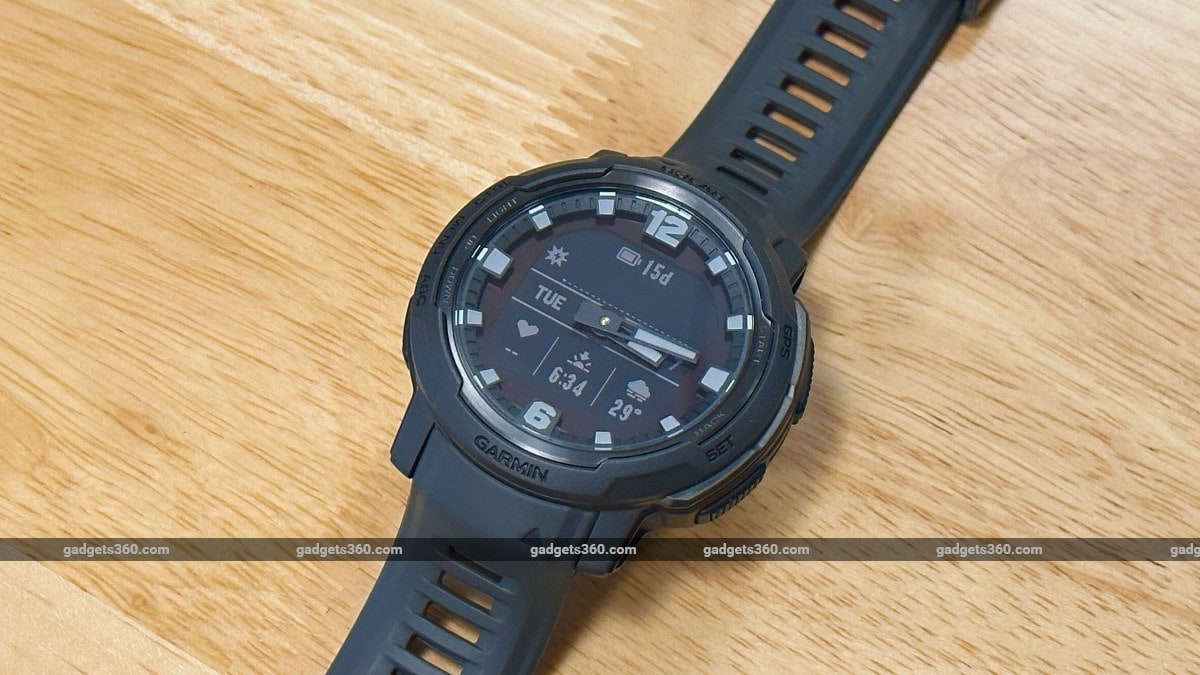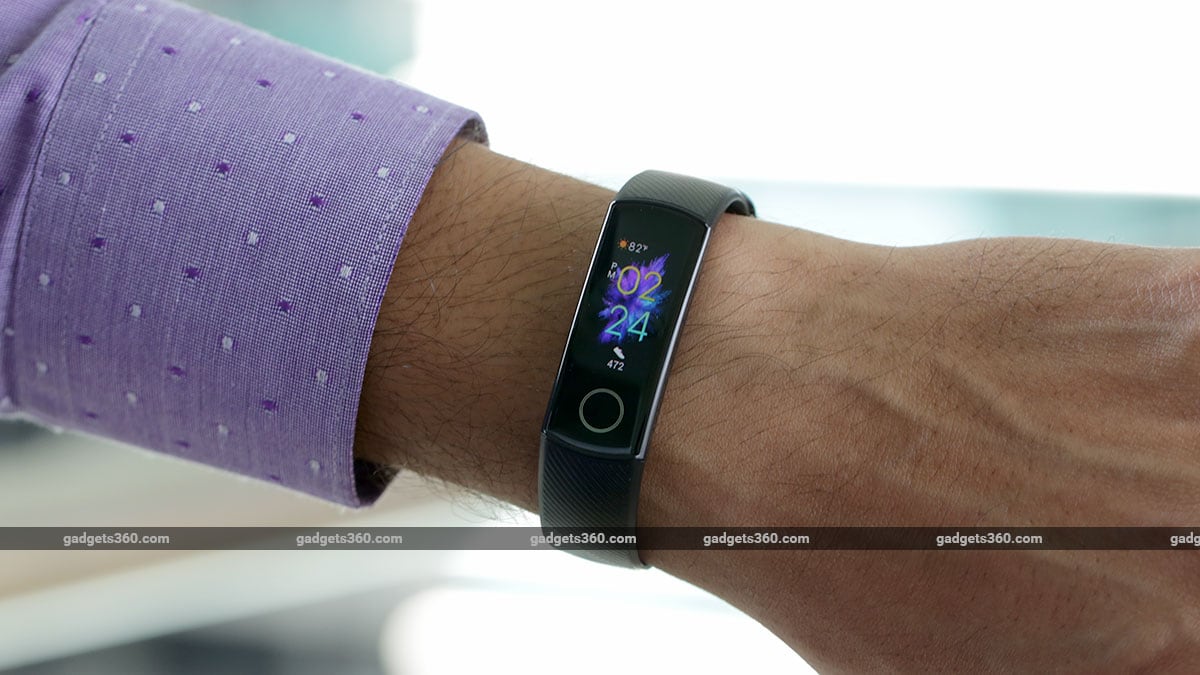Garmin’s Instinct Crossover Solar hybrid smartwatch is an update to its Instinct 2S Solar, which was launched in India last year. While the Instinct 2S Solar was launched as a multi-sport smartwatch with a rugged design, the Instinct Crossover Solar adds several updates. The visual updates include analogue hands for timekeeping, and a solar panel which can be used to charge the watch and power it infinitely.
While the watch is quite unique for a Garmin device, being the first smartwatch in its arsenal to combine the two features, there’s plenty more here to check out so let’s begin.
Garmin Instinct Crossover Solar price in India
The Garmin Instinct Crossover Solar is available in two variants. There’s the base Instinct Crossover variant called the Standard edition, which is priced at Rs. 55,990. The second in line is the solar variant, which is the one I have for review and is available at Rs. 61,990. As the name implies, it comes with the addition of a solar panel.
Garmin Instinct Crossover Solar design and specifications
The two variants of the new Garmin Instinct Crossover have the same external design but with slightly varying finishes. The Standard edition comes in Blue Granite and Black finishes, while the Solar variant comes in Graphite and Tidal Blue. I received former colour for review.
The Garmin Crossover Solar’s design is fairly similar to the previous Instinct 2 and the Instinct 2S series and features a case that’s made of a fibre-reinforced polymer with a stainless steel bezel insert. Compared to the Instinct 2 series, the display glass sits a lot higher and closer to the protective bezel which also makes it vulnerable to scratches.
Thankfully, despite having a few close calls, the lens which is made out of ‘Power Glass’ got just one tiny scratch during my review. The watch, while having double the thickness of the Apple Watch Series 8 Review, looks tough and rugged, and can take quite a beating. The case size measures 45mm and the watch has a thickness of 16.2mm.
![]()
The Garmin Instinct Crossover Solar looks very similar to the Instinct 2S model
The watch, with its removable silicone straps, weighs 65g and has a water rating of 10 ATM. It is also MIL-STD-810 certified for durability. Despite its rugged exterior and heavier than usual weight compared to a regular smartwatch, I did find the Garmin Instinct Crossover Solar quite comfortable to wear on a daily basis. The 22mm silicon straps are long enough to fit wrists of all sizes and Garmin sells some colourful options separately. The straps come with the common quick release mechanism, which is a bit difficult to access as the pins sit deep inside the lugs and requires a pointed tool to access.
Below the lens of the Garmin Instinct Crossover Solar is the cutout dial with all the necessary markings with luminescent paint to tell time. On the same level are the watch hands which are guided by Garmin’s Revodrive technology which claims to be able to maintain accurate timekeeping in all types of conditions (which also includes severe impacts).
Finally, below the hands sits the 1.28-inch monochrome, transflective memory-in-pixel (MIP) display sporting a resolution of 176 x 176 pixels. The solar cells are embedded in the centre and around this display. At the back of the watch are the usual health sensors along with the four-pin port which uses Garmin’s proprietary charging technology. The port is also used for downloading data to a computer or to upgrade the watch’s firmware manually using the Garmin Express app.
On the sides of the watch are the five buttons which have a nice clicky and tactile feel. In my opinion, this is the perfect, no-nonsense way to operate a smartwatch, especially one built for outdoor adventure use.
Garmin does not reveal the official battery capacity but we do know about its storage capacity which is a measly 64MB. This is fine given that most third-party apps (or activities) and watch faces are between 13kB to 150kB in size.
Garmin Instinct Crossover Solar performance
While the Garmin Instinct Crossover Solar is quite large, I initially found the monochrome display to be quite tiny, especially with the hands covering it all the time. The Amazfit GTR 4 (Review) is a lot larger in terms of case size, but still has a massive display in comparison. After a week of use, I started liking the button-driven software interface of the Instinct Crossover Solar and the smooth movement of the hands which smartly align themselves to get out of way of the content being displayed.
The only instance where the hands typically got in the way, is when viewing the main watch face. This meant I had to reach for my phone just to check things such as the date as the hands tend to cover them on the watch face at certain times. Two weeks after setting up and using the smartwatch, I did get used to the software, but I still feel that the display should have been a bit bigger keeping in mind the watch’s health tracking and outdoor capabilities, and the fact that it is also a smartwatch.
![]()
The Garmin Instinct Crossover Solar has five buttons for software operation
The Garmin Instinct Crossover Solar runs Garmin’s custom OS which is very light and responsive, given that it needs five buttons and not a touch display to operate. There’s also the fact that the display resolution is fairly low, so it’s not much of a strain on the watch. Indeed, there’s not much of an interface, but the button-operated OS is very well laid out, once you get used to the navigation style.
While this operating system is far from the likes of the more connected Apple Watch, it works really well even without the need to connect to your smartphone. This is mainly because everything that the watch is capable of (in terms of tracking and features) can be commenced and viewed on the watch itself. There’s little to no need for it to be connected to a smartphone, unless you want to view your health data on a bigger display.
What you will need the Garmin Connect mobile app for is setting up the watch and for relaying the usual smartphone notifications to it. The app works well on both iOS and Android smartphones but I preferred using it with an Android phone as it lets you reply to notifications too. This is not possible when connected to an iPhone. The app also enables an incident detection feature, which will automatically notify your three pre-selected contacts via SMS or email.
Setting up the emergency feature will require you to send a message to each of the contacts via the app. But more importantly, the watch will rely on the phone for sending messages, so the user will need to have network connectivity for it to work. It won’t be of much use it you’re lost in the wilderness, but could be handy in the case of a fall or an accident in urban areas.
![]()
The solar cells (seen in brown) are embedded into the display and are located in a thin layer around it and in the centre
The Garmin Instinct Crossover Solar comes with a plethora of fitness modes, most of which are built-in and many of which can be downloaded (like an app) from the Garmin Connect IQ app. No matter what sporting or outdoor activity you are into, there most likely will be an app or activity available for it. There’s also the multi-sport mode which is vital for triathlon runners as it is capable of tracking running, swimming and cycling all in one activity. Activities such as yoga can be recorded based on the type of pose being performed. Lastly, the watch also offers Tracback routing, and can help you find your way back, in case you happen to get lost.
In terms of activity tracking, the results from the Garmin Instinct Crossover Solar were quite accurate. GPS tracking (thanks to its multi-band support) while walking was excellent, along with accurate step counts. I also tried the floor climbing activity which was spot on. Sleep tracking was quite accurate as well with detailed sleep stages along with SpO2 and heart rate readings, but can also be horribly inaccurate at times.
SpO2 readings were not accurate when compared to a standalone pulse oximeter. For those who take their health and fitness tracking very seriously, Garmin also sells a number of dedicated accessories for Pro users such as golfing monitors, pedals for your cycle, to heart rate monitors that you can strap to your chest. These dedicated devices are designed to record highly accurate data and send it directly to the watch. Prices range from Rs. 6,000 to Rs, 13,000 for the heart rate monitors, and can go all the way up to Rs. 68,000 for some sporting accessories.
Battery life is where the Garmin Instinct Crossover Solar’s solar cells come into play. Garmin claims that the watch can run infinitely using the solar cells, but there’s a bit of a catch. The thinly laid out solar cells around the perimeter of the display do a good job of charging up quickly when exposed to sunlight. However, the conditions for infinite battery life will need a user to be outdoors with the watch exposed to direct sunlight (specifically 50,000 lux conditions) for three hours a day.
![]()
The Garmin Instinct Crossover Solar uses the company’s own proprietary four-pin charging adapter
What is impressive is the analogue-only mode in which only the hands work to show the time, while the rest of the smartwatch (including GPS tracking, etc) remains switched off. This mode can function for weeks on less than one percent battery, basically functioning as a traditional wrist watch.
With regular use when connected to a smartphone, I easily managed a whole week on one charge. This included a few workouts every day along with constant notifications from my smartphone and the pulse oximeter with the heart rate readings working day and night. Other sensors such as the compass, altimeter and barometer were set to ‘Auto’ and came in use from time to time.
The backlight brightness was set to 20 percent and was set to turn on only after sunset as the display was clearly visible indoors and outdoors during the day. Garmin claims that the watch can last up to 40 days on a single charge using just the battery when used for expedition purposes (GPS always-on), which can be life-saving depending on how it’s used. Charging the watch is a bit slow as the proprietary adapter, even when connected to a 30W USB PD charger, took a lengthy 2 hours, 27 minutes to complete.
Verdict
If you are triathlon runner, love hiking, or even a casual fitness-oriented user looking for accurate data tracking (using the additional accessories), the Garmin Instinct Crossover Solar offers a good mix of casual design with the ruggedness, functionality and reliability of a multi-sport watch. At Rs. 61,990 it cannot be compared to a regular smartwatch solely because it belongs in a different category of sport and outdoor trackers in my opinion. The only smartwatch that comes close to the Instinct Crossover Solar is the Apple Watch Ultra, which is still limited to a three-day battery life and only works with an iPhone. It’s also priced a lot higher at Rs. 89,900, but gets you LTE and calling functionality too.
Oddly, in India, the Garmin Instinct Crossover Solar’s biggest competitor is the Garmin Forerunner 955 Solar, which covers all the basics but is geared more towards runners and is not as rugged. Price at Rs. 63,990, the Forerunner 955 Solar does not feature analogue hands like the Crossover, but offers a larger and more legible colour display, 32GB of storage (for those who need it) and a claimed longer battery life, along with detailed map views and turn-by-turn navigation.



